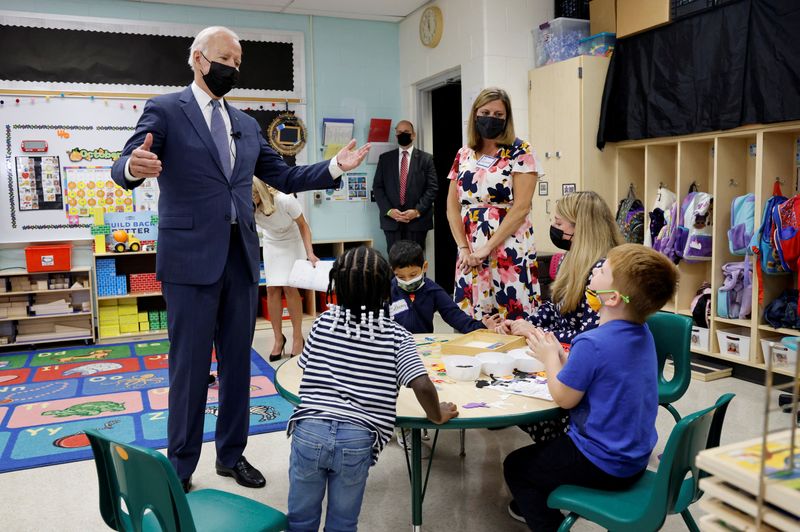By Andy Sullivan
WASHINGTON (Reuters) - U.S. President Joe Biden's budget proposal, released on Thursday, envisions a dramatic expansion of the federal safety net for children and families. Unlike programs that benefit older Americans, it stands little chance of gaining traction.
Biden's fellow Democrats widely back his family-focused proposals: Tax credits, free preschool, subsidies for child care and paid family leave.
But Democrats failed to pass them into law when they controlled both chambers of Congress last year, and Republicans who now control the House of Representatives are considering steep cuts to existing family programs.
At a total cost of $1.6 trillion over 10 years, Biden's family programs would amount to roughly 2% of all federal spending, according to a Reuters analysis, a proposal that Republican House Speaker Kevin McCarthy called "completely unserious" on Thursday.
That would be dwarfed by the $31.8 trillion spent on Social Security and Medicare, the retirement and health plans for people over 65, according to Biden's budget.
Those two programs are due to balloon as the Baby Boom generation ages, with Biden's budget projecting they will account for 42% of federal spending in 2033, up from 34% today.
But Republicans and Democrats have said any cuts to either program are off limits as they gird for difficult negotiations to raise the nation's $31.4 trillion debt ceiling this year.
"I guarantee you I will protect Social Security and Medicare," Biden said at a rally in Philadelphia on Thursday.
That makes good political sense. Republican proposals to scale the two programs back have been met with fierce resistance from Democrats and interest groups over the past 20 years. Even modest efforts to rein them in, such as by adjusting the way benefit increases are calculated, have gotten nowhere in Congress.
The 60 Plus Association, a conservative group that backed then-President George W. Bush's proposal to partially privatize Social Security, now says the program should be preserved as is.
Lawmakers have reason to be wary: Older Americans are more likely to vote than their younger counterparts, with Census Bureau data showing that 76% of voters aged 65 to 74 cast a ballot in the 2020 elections, about 10 percentage points higher than the population at large.
A presentation by the nonpartisan Congressional Budget Office to House lawmakers on Wednesday laid out options for addressing the deficit and projected that spending cuts would have substantially less effect on the deficit than increased tax collections.
Biden's budget proposal projects a deficit of $1.7 trillion for the current fiscal year. His proposal would address it by hiking taxes on wealthy Americans and corporations; Republicans have yet to put forward a budget of their own, but many are calling for steep domestic spending cuts.
HEAD START: CUT OR EXPAND?
One proposal by the conservative Republican Study Committee calls for phasing out the Head Start preschool program for low-income families over 10 years.
Another plan circulated by Russell Vought, who served as former President Donald Trump's budget director, would cut Head Start immediately by 50%.
Biden, by contrast, would boost Head Start funding by 9% next year.
His proposal comes after a surge of COVID-19 pandemic spending, including child tax credits and expanded benefits for antipoverty programs, that analysts say helped bring a record low child poverty rate of 5.2% in 2021.
That tax credit expired at the end of 2021. If revived, it would cost the government $259 billion in the next fiscal year -- equal to 4% of total federal spending.
Federal spending on children is on track to decline from 9.4% of the budget in 2021 to 6.4% in coming years as growing entitlement spending eats up a growing share of the budget, according to a 2022 report from the Urban Institute think tank.

Elaine Maag, who helped author that report, said lawmakers usually do not consider that safety-net programs for children can yield benefits later on, such as higher graduation rates and better physical health.
"We generally don't think about the benefits of these investments in children, we just think about the cost side," she said. "If we thought more about the benefits, we might do more investing in kids."